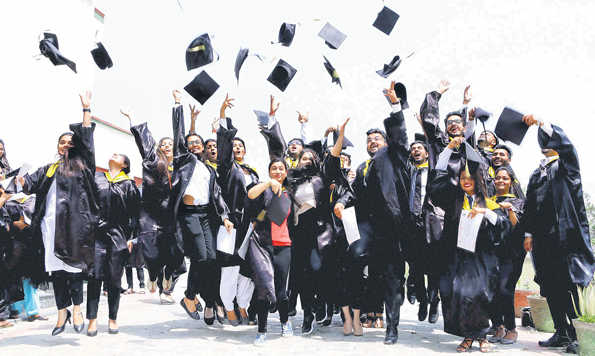
PTI
Shelley Walia
The quality of teaching suffers severely if research scholars are not held to the high standards expected in a prestigious academic institution, which should inspire and encourage the student body to liberally evaluate diverse opinions, thereby helping in the growth of the university as a dynamic social organ, tolerant and accepting of a multiplicity of perspectives.
This forms the fundamental core of advanced centres of learning that constantly grapple with the self-serving, politicised attitude evident in modern day academic leadership, incapable or unmotivated to uphold the rigorous standards against the prevailing political winds.
Nothing but additional attention and rigour towards the quality of research and teaching will take our universities to new frontiers of knowledge and thought. This would depend largely on the implementation of strict standards for the selection procedures of research scholars - our teachers of the future - even when they happen to fall in the reserved categories.
A serious conundrum
A serious academic conundrum has risen in Panjab University in the last few weeks. Departments in the university had carried out the doctoral admission exercise in the past month keeping in mind the UGC norms of holding a common entrance examination for MPhil/PhD scholars and then putting the successful candidates through an interview, a requirement laid down unequivocally in the rules. The departments are supposed to take no liberties with the national policy on reservation and ensure that the required number of seats for the reserved categories stand filled on the condition that the candidate shows some spark for research in the interview. Yet the departments of Panjab University have been asked to remove the cut-off altogether so that those scoring below the national reservation cut-off may also get in on the rationale that "seats" have to be filled.
Ignoring attributes
In the last few days, the Panjab University authorities have consistently bent and twisted their own rules, not once but many times. Once modalities are completed and rules framed, examinations taken and results declared, interviews conducted and classes begun, one cannot begin to doubt the screening process. The new rules that have been circulated after the results have been declared judge candidates on the basis of their undergraduate and postgraduate scores, ignoring the candidate's fitness to think and speak, and thereby clearly overlooking the view that the ability to articulate one's thoughts forms the basis of sound teaching. Should a candidate who scores low marks in the interview process, and is not able to answer a single question, still make it to the final selection? Even though national and international rankings are important to the academic health of the university, must quality be sacrificed to quantity?
Is MPhil necessary?
Universities are not conveyer belts where all those who clear the written examination or the National Education Test, or even obtain a Junior Research Fellowship of the University Grants Commission, have full rights for access to the highest degree the university offers. Panjab University runs what may be called a "preparatory" research degree, called the Master of Philosophy (MPhil). It may be cited that universities such as the Cambridge and Oxford often advise their candidates against taking up the PhD course on the grounds that they are more suitable for first undertaking the MPhil course. If the candidate does not qualify for the PhD, s/he is free to appear for the MPhil interview instead of wasting a year. I have come across some of the brightest students who opt for the MPhil programme that runs for two semesters comprising four courses, a written exam, and a number of seminars and term papers thrown in. This pre-PhD training is a demanding foundational platform which equips the candidates with the necessary tools and methodologies required to pursue a more rigorous and exhaustive PhD.
I say this without any hesitation as I also opted for MPhil at the start of my career after which I went on to teach MPhil candidates for over three decades. The questions before me at the present juncture are: Are we not looking for trained research scholars who will ultimately make ideal teachers? Or do we want raw students fresh out of MA, unwisely opting for PhD and ending up floundering for years, struggling to write a mere footnote?
A university has to obey the national policy, but the government itself should keep research potential above partisan politics so that universities may not ignore one of the basic bench marks in the evaluation of aptitude for research. Universities must not be pushed to open the floodgates to mediocrity. The whole exercise of drafting new PhD rules at Panjab University, therefore, indicates an education deficit. This, according to Henry Giroux, Canadian educationist, "exhibits a growing inability to think critically, question authority, be reflective, weigh evidence, discriminate between reasoned arguments and opinions." Edifices of dominance are maintained and enhanced through engineering complicity with political power structures and surrendering to "omissions, deceptions, lies, misrepresentations and falsehoods."
Let our interest not lie in the increase of enrolment and in the maintenance of scholars who uphold dominant ideological leanings and serve an authoritarian establishment. A critical formative culture requires a critical pedagogy that is equipped to boldly defy the present situation in which those who execute their responsibility with fairness and objectivity are denigrated and the quest for excellence is overruled by the valorisation of mediocrity. Sadly, quantity outruns quality.
The writer is Professor Emeritus and Fellow of Panjab University



























